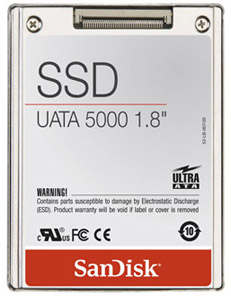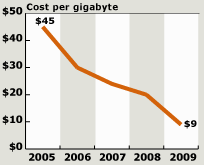wishing all 12thies and 10thies
“BEST OF LUCK”
for your pre-boards…
wishing all 12thies and 10thies
“BEST OF LUCK”
for your pre-boards…
Ladies and Gentlemen, today is Mohit Taneja’s birthday. If you haven’t done so already, please wish him.
Once again, Happy Birthday Mohit.
Dhruv

SanDisk on Thursday released a 32GB drive for commercial notebooks that stores information on flash memory chips rather than the magnetic platters that make up a traditional hard drive.
Such a swap will make thin laptops faster and more reliable.
Source: Seagate
Why go flash?
Unlike traditional hard drives, flash memory drives do not contain moving parts. As a result, flash devices are less prone to breaking down–flash cards can survive drops from great heights–and consume less energy.
Flash also can retrieve data faster. In its own tests, Sandisk says its flash drive can boot-up Windows Vista–the next version of the Windows operating system–in 35 seconds, a half-minute faster than the 55-second boot-up time required with a conventional drive.
Military and aerospace customers have been buying so-called solid-state flash drives for about a decade. Some of the drives have capacities of 256GB and are quite sophisticated.
What’s the catch?
The flash drive isn’t for everyone. At 32GB, it is far smaller than the conventional drives found in current notebooks, desktops or even MP3 players. Many business users, however, never max out the capacity on their drives.
The drive will also add about $600 to the cost of a notebook. Those prices will hinder sales.
Meanwhile, drive makers point out that hard drives also continue to increase in data density and are far less expensive. Hitachi executives have said drives that can hold a terabyte of data are on the horizon.
Internet video will choke flash. An hour of standard video gobbles up about 1GB, while an hour of high-definition video will take up 4GB, according to various estimates.
Still…
 The capacity and price gaps will begin to erode over time. NAND flash memory makers (NAND is the kind SanDisk makes) have managed to double the storage capacity of its chips nearly every year for the past few years.
The capacity and price gaps will begin to erode over time. NAND flash memory makers (NAND is the kind SanDisk makes) have managed to double the storage capacity of its chips nearly every year for the past few years.
With growth actually exceeding Moore’s Law, who knows, in another two or three year’s time, our laptops may just get a little flashier!
Sources: CNET.com, Wikipedia
The hip computer maker battles with another headache
Shortly following news of Apple’s stock options backdating scandal, the Associated Press is reporting that the company is now facing several lawsuits, including one alleging that Apple is monopolizing the digital music market.
The lawsuit is over Apple’s proprietary iPod and iTunes software, which is generally incompatible with non-Apple products. Media purchased on iTunes is supposed to be playable only on iPod hardware, and songs purchased on other DRM systems are not easily playable on iPods.
Apple motioned for the courts to dismiss the case, originally filed July 21, but the courts denied the motion on Dec. 20. The plaintiff seeks unspecified compensation.
Apple is also facing a lawsuit, filed on Nov. 7, over the supposed high failure rate of the logic board in the iBook G4. Another lawsuit filed by PhatRat Technology accuses Apple of patent infringement for its iPod-Nike product.
While the iPod reigns supreme in the music player market, Apple’s success has not come without a price. Last year, Creative Labs sued Apple over patent infringement of the iPod interface, which eventually lead to a countersuit. The companies eventually settled on having Apple pay Creative $100 million for use of the patented technology.
The popularity of the iPod has drawn attention from hackers discontent with the proprietary nature of the device. Jon Lech Johansen, who cracked DVD encryption, has undone Apple’s protection scheme and plans to license his work to companies interested in opening up interoperability between iPod/iTunes and non-Apple devices.
Hello
Happy New Year to all of you
May this bring tons of happiness, great results and may the 12thies get into cool universities
G